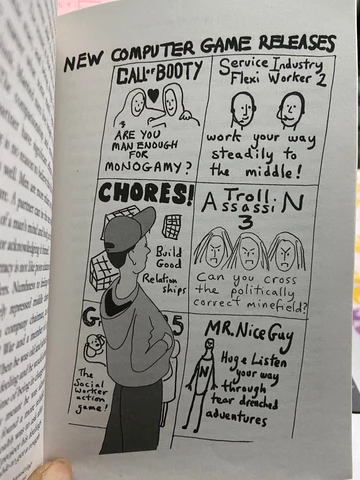Grayson Perry’s ‘The Descent of Man’. Review by Dhvani Barot.
The Descent of Man by Grayson Perry is a treatise which discusses masculinity and all its various forms. It takes its title from naturalist Charles Darwin’s The Descent of Man, and Selection in Relation to Sex.
In the introduction of his Descent, Darwin laid down out the purpose of his text:
“The sole object of this work is to consider, firstly, whether man, like every other species, is descended from some pre-existing form; secondly, the manner of his development; and thirdly, the value of the differences between the so-called races of man.
Just for fun, If I was to try to do the same for Grayson Perry’s Descent of man it would go something like:
“The sole object of this work is to consider, firstly, whether man, like every other species, must conform to some pre-existing form of masculinity; secondly, the manner of the development of this masculinity; and thirdly, the value of the masculinity in the lives of the so-called races of man.
Masculinity can be a very hard topic to dissect and discuss because of how nuanced and ever changing it can be but Grayson Perry does it with ease in this book.
As a transvestite who occasionally wears female-assigned clothing, he sees himself as having been contemplating his own responses to ideas of femininity and masculinity from a young age, and therefore as particularly capable of identifying the problematic gender constructions of modern society.
In the very beginning of the book Perry writes:
“Examining masculinity can seem like a luxury problem, a pastime for wealthy, well-educated, peaceful society, but I would argue the opposite: the poorer, the more undeveloped, the more uneducated a society is, the more masculinity needs realigning with the modern world, because masculinity is probably holding back that society. All over the globe, crimes are committed, wars are started, women are being held back and economies are disastrously distorted by men, because of their outdated version of masculinity.” Which I found very intriguing and eloquently put. Often discussing gender and gender norms is trivialized and considered as creating problems where they don’t exist. I hope this paragraph makes people want to spend more time questioning gender in the everyday spaces they occupy.
The book skillfully breaks down masculinity into easy terms such as the Default Man, the Department of Masculinity and the Nostalgic Man. Using these terms, he gives a name to the various types of masculinity we see but may find hard to notice or articulate. Interspersed between his descriptions of masculinity are anecdotes of his life and experiences, some hilarious, some sad and some self-reflective and deeply personal. All these help in making the discussion more real and less like an intellectual and preachy one.
The book is also filled with statistics showing the measurable effect of toxic masculinity on men, women and those who identify as both or neither; and society as a whole which help shut up people who think toxic masculinity isn’t real.
The book is very well written and thought provoking. Its primary purpose is to help men realize that they are also victims of the masculinity they are trying so hard to emulate and show them the various ways masculinity has changed the way they lead their lives.
It makes some interesting points, among which is the idea that men’s traditional advantage ‘brute strength’ has become less of an advantage in a world that’s become more and more geared toward emotional intelligence. “The brain, the very organ that has given the human race its success, may have long ago set in train a process—modernity and democracy—that may be incompatible with traditional masculinity,” Grayson Perry notes.
Men’s traditional conditioning to feel superior is at odds with the notion of a world where everyone is truly equal, which explains why some men “feel feminism is an attack on their core identity rather than a call for equality.”
My favourite part by far in the book were the illustrations. They were creative, witty and downright hilarious. A personal favorite was of the new video games that should be released to help teach men about aspects of masculinity.

As feminists, there may not be a lot of ground breaking ideologies or topics discussed in the book and the issues he raises about the social construction of gender are ones that I hope are already being questioned. Nevertheless, it is an entertaining and comprehensive take on beliefs we all share.
There are a lot of moments when you will go ‘I know, right!!’ and feel validated.
One problematic part is where Perry states that the only way for feminists to get men fully on board with gender equality and feminism is to frame it in a way which makes it seem that it will be to their benefit. One would hope decent people recognize that equality is important regardless of what side of the divide they’re currently standing on.
Will men genuinely learn to embrace feminist ideas if they’re manipulated to believe it’s still all about them?
All in all, the book is a good conversation starter and an ambitious attempt to shine light on the basis of masculinity. It gives some great food for thought such as how to inculcate modern masculinity to adolescents without good role models, the link between masculinity and sexual nostalgia and hilarious startup ideas like marathons with prams and pubs with creches.






